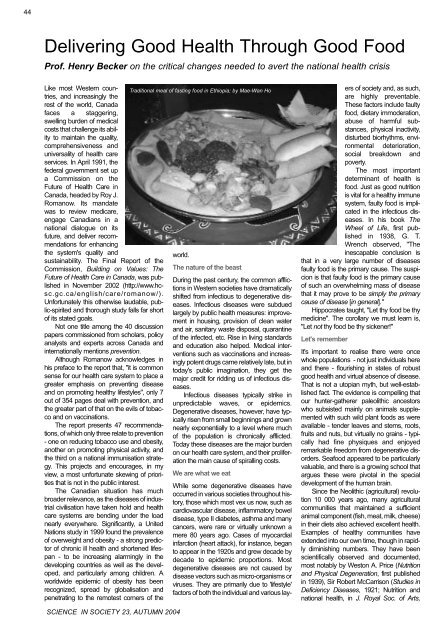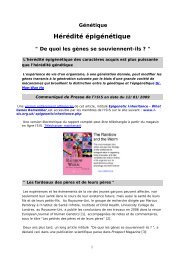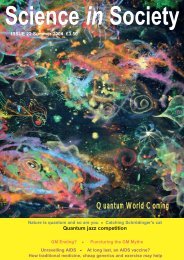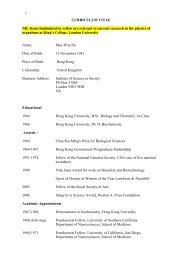Ethiopia goes organic to feed herself - The Institute of Science In ...
Ethiopia goes organic to feed herself - The Institute of Science In ...
Ethiopia goes organic to feed herself - The Institute of Science In ...
You also want an ePaper? Increase the reach of your titles
YUMPU automatically turns print PDFs into web optimized ePapers that Google loves.
44<br />
Delivering Good Health Through Good Food<br />
Pr<strong>of</strong>. Henry Becker on the critical changes needed <strong>to</strong> avert the national health crisis<br />
Like most Western countries,<br />
and increasingly the<br />
rest <strong>of</strong> the world, Canada<br />
faces a staggering,<br />
swelling burden <strong>of</strong> medical<br />
costs that challenge its ability<br />
<strong>to</strong> maintain the quality,<br />
comprehensiveness and<br />
universality <strong>of</strong> health care<br />
services. <strong>In</strong> April 1991, the<br />
federal government set up<br />
a Commission on the<br />
Future <strong>of</strong> Health Care in<br />
Canada, headed by Roy J.<br />
Romanow. Its mandate<br />
was <strong>to</strong> review medicare,<br />
engage Canadians in a<br />
national dialogue on its<br />
future, and deliver recommendations<br />
for enhancing<br />
the system's quality and<br />
sustainability. <strong>The</strong> Final Report <strong>of</strong> the<br />
Commission, Building on Values: <strong>The</strong><br />
Future <strong>of</strong> Health Care in Canada, was published<br />
in November 2002 (http://www.hcsc.gc.ca/english/care/romanow/).<br />
Unfortunately this otherwise laudable, public-spirited<br />
and thorough study falls far short<br />
<strong>of</strong> its stated goals.<br />
Not one title among the 40 discussion<br />
papers commissioned from scholars, policy<br />
analysts and experts across Canada and<br />
internationally mentions prevention.<br />
Although Romanow acknowledges in<br />
his preface <strong>to</strong> the report that, "it is common<br />
sense for our health care system <strong>to</strong> place a<br />
greater emphasis on preventing disease<br />
and on promoting healthy lifestyles", only 7<br />
out <strong>of</strong> 354 pages deal with prevention, and<br />
the greater part <strong>of</strong> that on the evils <strong>of</strong> <strong>to</strong>bacco<br />
and on vaccinations.<br />
<strong>The</strong> report presents 47 recommendations,<br />
<strong>of</strong> which only three relate <strong>to</strong> prevention<br />
- one on reducing <strong>to</strong>bacco use and obesity,<br />
another on promoting physical activity, and<br />
the third on a national immunisation strategy.<br />
This projects and encourages, in my<br />
view, a most unfortunate skewing <strong>of</strong> priorities<br />
that is not in the public interest.<br />
<strong>The</strong> Canadian situation has much<br />
broader relevance, as the diseases <strong>of</strong> industrial<br />
civilisation have taken hold and health<br />
care systems are bending under the load<br />
nearly everywhere. Significantly, a United<br />
Nations study in 1999 found the prevalence<br />
<strong>of</strong> overweight and obesity - a strong predic<strong>to</strong>r<br />
<strong>of</strong> chronic ill health and shortened lifespan<br />
- <strong>to</strong> be increasing alarmingly in the<br />
developing countries as well as the developed,<br />
and particularly among children. A<br />
worldwide epidemic <strong>of</strong> obesity has been<br />
recognized, spread by globalisation and<br />
penetrating <strong>to</strong> the remotest corners <strong>of</strong> the<br />
Traditional meal <strong>of</strong> fasting food in <strong>Ethiopia</strong>; by Mae-Wan Ho<br />
world.<br />
<strong>The</strong> nature <strong>of</strong> the beast<br />
During the past century, the common afflictions<br />
in Western societies have dramatically<br />
shifted from infectious <strong>to</strong> degenerative diseases.<br />
<strong>In</strong>fectious diseases were subdued<br />
largely by public health measures: improvement<br />
in housing, provision <strong>of</strong> clean water<br />
and air, sanitary waste disposal, quarantine<br />
<strong>of</strong> the infected, etc. Rise in living standards<br />
and education also helped. Medical interventions<br />
such as vaccinations and increasingly<br />
potent drugs came relatively late, but in<br />
<strong>to</strong>day's public imagination, they get the<br />
major credit for ridding us <strong>of</strong> infectious diseases.<br />
<strong>In</strong>fectious diseases typically strike in<br />
unpredictable waves, or epidemics.<br />
Degenerative diseases, however, have typically<br />
risen from small beginnings and grown<br />
nearly exponentially <strong>to</strong> a level where much<br />
<strong>of</strong> the population is chronically afflicted.<br />
Today these diseases are the major burden<br />
on our health care system, and their proliferation<br />
the main cause <strong>of</strong> spiralling costs.<br />
We are what we eat<br />
While some degenerative diseases have<br />
occurred in various societies throughout his<strong>to</strong>ry,<br />
those which most vex us now, such as<br />
cardiovascular disease, inflamma<strong>to</strong>ry bowel<br />
disease, type II diabetes, asthma and many<br />
cancers, were rare or virtually unknown a<br />
mere 80 years ago. Cases <strong>of</strong> myocardial<br />
infarction (heart attack), for instance, began<br />
<strong>to</strong> appear in the 1920s and grew decade by<br />
decade <strong>to</strong> epidemic proportions. Most<br />
degenerative diseases are not caused by<br />
disease vec<strong>to</strong>rs such as micro-organisms or<br />
viruses. <strong>The</strong>y are primarily due <strong>to</strong> 'lifestyle'<br />
fac<strong>to</strong>rs <strong>of</strong> both the individual and various layers<br />
<strong>of</strong> society and, as such,<br />
are highly preventable.<br />
<strong>The</strong>se fac<strong>to</strong>rs include faulty<br />
food, dietary immoderation,<br />
abuse <strong>of</strong> harmful substances,<br />
physical inactivity,<br />
disturbed biorhythms, environmental<br />
deterioration,<br />
social breakdown and<br />
poverty.<br />
<strong>The</strong> most important<br />
determinant <strong>of</strong> health is<br />
food. Just as good nutrition<br />
is vital for a healthy immune<br />
system, faulty food is implicated<br />
in the infectious diseases.<br />
<strong>In</strong> his book <strong>The</strong><br />
Wheel <strong>of</strong> Life, first published<br />
in 1938, G. T.<br />
Wrench observed, "<strong>The</strong><br />
inescapable conclusion is<br />
that in a very large number <strong>of</strong> diseases<br />
faulty food is the primary cause. <strong>The</strong> suspicion<br />
is that faulty food is the primary cause<br />
<strong>of</strong> such an overwhelming mass <strong>of</strong> disease<br />
that it may prove <strong>to</strong> be simply the primary<br />
cause <strong>of</strong> disease [in general]."<br />
Hippocrates taught, "Let thy food be thy<br />
medicine". <strong>The</strong> corollary we must learn is,<br />
"Let not thy food be thy sickener!"<br />
Let's remember<br />
It's important <strong>to</strong> realise there were once<br />
whole populations - not just individuals here<br />
and there - flourishing in states <strong>of</strong> robust<br />
good health and virtual absence <strong>of</strong> disease.<br />
That is not a u<strong>to</strong>pian myth, but well-established<br />
fact. <strong>The</strong> evidence is compelling that<br />
our hunter-gatherer paleolithic ances<strong>to</strong>rs<br />
who subsisted mainly on animals supplemented<br />
with such wild plant foods as were<br />
available - tender leaves and stems, roots,<br />
fruits and nuts, but virtually no grains - typically<br />
had fine physiques and enjoyed<br />
remarkable freedom from degenerative disorders.<br />
Seafood appeared <strong>to</strong> be particularly<br />
valuable, and there is a growing school that<br />
argues these were pivotal in the special<br />
development <strong>of</strong> the human brain.<br />
Since the Neolithic (agricultural) revolution<br />
10 000 years ago, many agricultural<br />
communities that maintained a sufficient<br />
animal component (fish, meat, milk, cheese)<br />
in their diets also achieved excellent health.<br />
Examples <strong>of</strong> healthy communities have<br />
extended in<strong>to</strong> our own time, though in rapidly<br />
diminishing numbers. <strong>The</strong>y have been<br />
scientifically observed and documented,<br />
most notably by Wes<strong>to</strong>n A. Price (Nutrition<br />
and Physical Degeneration, first published<br />
in 1939), Sir Robert McCarrison (Studies in<br />
Deficiency Diseases, 1921; Nutrition and<br />
national health, in J. Royal Soc. <strong>of</strong> Arts,<br />
SCIENCE IN SOCIETY 23, AUTUMN 2004











